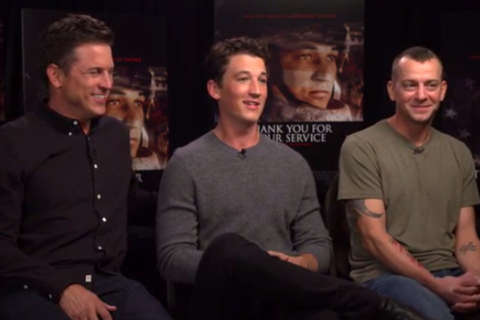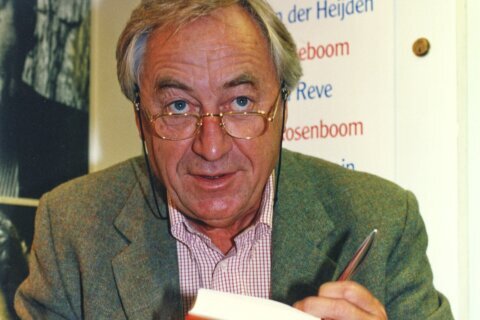
WASHINGTON — We’ve all told the troops at some point, “Thank you for your service.” But what exactly do those five words mean? Can any civilian truly understand a soldier’s sacrifice?
That’s the theme of writer/director Jason Hall’s new war biopic “Thank You For Your Service,” based on David Finkel’s 2013 book, a finalist for the National Book Critics Circle Award.
It tells the true story of Iraq War veteran Adam Schumann (Miles Teller), who returns home to North Dakota and struggles to transition back into civilian life. He hides his PTSD from his wife (Haley Bennett), suffers flashbacks of fallen comrade James Doster (Brad Beyer) and feels guilty for widowing Doster’s wife (Amy Schumer), all while being the rock for his band of brothers Will Waller (Joe Cole), Tausolo Aieti (Beulah Koale) and Michael Emory (Scott Haze).
The film’s real-life inspiration, Adam Schumann, says it was tough but therapeutic to watch.
“It was very emotional for me, both highs and lows,” Schumann told WTOP. “If I wasn’t sitting there sobbing [and] feeling all those feelings again, then they didn’t do their jobs. Every time I watch it, I’m just a mess for a good day or two. It’s a credit to how hard everybody worked.”
Which part of the movie is the hardest for him to watch?
“Most definitely when Sergeant First Class James Doster was killed,” Schumann said, his voice noticeably cracking. “He had looked at me 10 minutes before that, gave me a smile and told me to take a break. They left on a patrol without me and they got just outside the FOB [forward operating base] and they were hit with an EFP [explosively formed penetrator].”
It’s up to Teller as an actor to bring such raw emotion to the screen.
“I was talking to a guy just a couple years removed from war, so I knew it was extremely sensitive,” Teller said. “We’re dealing with the worst times of his life, but we only had two days together so I really needed to get some stuff out of him. … He’s been tremendous. For him to just give himself over to this whole process, I don’t know many people who would do that.”
It’s arguably Teller’s most mature performance to date, having burst onto the scene with powerful coming-of-age roles in such indie gems as “The Spectacular Now” (2013) and “Whiplash” (2014), in which J.K. Simmons won an Oscar for Best Supporting Actor. Of all the roles he could have chosen in his career trajectory, why did Teller choose this particular one?
“The older you get, hopefully you’re handed really quality projects,” Teller said. “I enjoy parts that require a lot and [Hall] wrote an incredible script. I was very intimidated at first, so that’s why I gravitated toward it. … I read the script, that was the introduction to Adam and his comrades, then I read both of Finkel’s books and a couple of books on post-traumatic stress.”
Teller rises to the challenge of giving a double-layered performance, simultaneously showing a strong facade for his wife, while also showing his PTSD bubbling beneath the surface.
“I’ve heard a couple guys use the metaphor of ducks,” Teller said. “Ducks on the surface are real cool, calm and collected, but underneath, man, they’re paddling and treading. That makes for a really complex person. Adam himself is extremely dynamic and he’s not who you would think he would be as whatever cliché or stereotype you’d give to an officer coming back.”
While the overall structure isn’t exactly groundbreaking, the script deserves credit for a plot that doesn’t go exactly where you think it’s going to go. There’s a point where you think Tausolo’s dogfighting will be the end of him like Christopher Walken’s Russian roulette in “The Deer Hunter” (1978), but Hall switches things up and cleverly subverts our expectations.
“I love ‘Deer Hunter’ [but] it’s a funny film because there was no Russian roulette in Vietnam; it was a metaphor,” Hall said. “I definitely embraced the idea of metaphor in this film.”
After penning Clint Eastwood’s “American Sniper” (2014), Hall now makes his directorial debut.
“I picked up a lot from Clint,” Hall said. “Clint’s a very cool customer and really trusts himself. He trusts his instincts. If he sees or feels something, he does it. So, I try to stay loose and cool and give everybody a long lunch. That’s Clint’s thing: He gives a long lunch and leaves early.”
Like “American Sniper,” Hall adapted a book into a film about a real-life soldier.
“The challenge of adapting a nonfiction book to film is you have [roughly] two hours to find a way to weave all these stories together,” Hall said. “Often times people look at a film about real-life events and say, ‘That part isn’t true, that part isn’t true.’ The challenge is making a film about real events mean something. If I made a film about my life, it’d be nothing.”
“Nobody would watch it,” Teller joked. “Long lunches! That’s the title of your memoir!”
All joking aside, what do they hope audiences will take away?
“After decades overseas, it’s time that we start a conversation with veterans,” Hall said. “It’s time that we understand more about what they went through. Hopefully this film does that and puts the audience in the front seat of the veteran walking back into their family, back into their homes, back into their lives, how tough that is, how alien that world is when they come home. Maybe it will allow us [to] ask them how their service was, rather than just thank them.”










